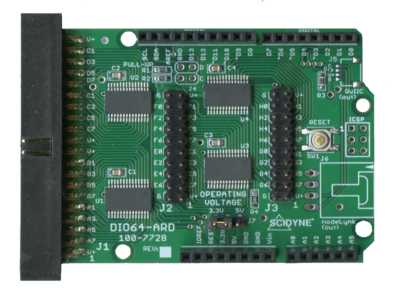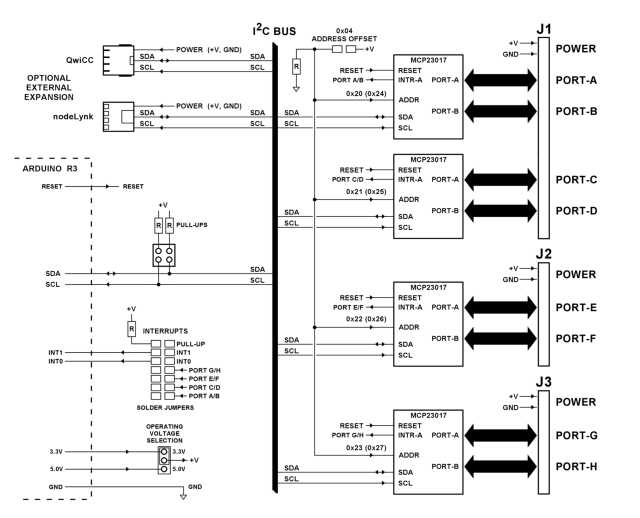DIO64-ARD
64-Channel Digital I/O Interface for Arduino, Genuino, Due, and Compatibles



DESCRIPTION
The DIO64-ARD adds 64 digital I/O channels to an Arduino/Genuino UNO, MEGA 2560, Due, or other compatibles. Four industry standard MCP23017 chips are used to create eight 8-bit ports via the I2C bus.
Channels are individually defined through software to operate as either an input or output. Optional Pull-Ups can be enabled for channels configured as inputs.
The DIO64-ARD occupies four consecutive I2C addresses. Standard Arduino Wire library functions control its operation. In addition, the DIO64-ARD fully supports popular third-party software libraries like those available from Adafruit and SparkFun.
External devices connect to the DIO64-ARD through a 40 conductor IDC ribbon cable style connector and two 20 position headers. These connectors also provide access to the system operating voltage and ground.
FEATURES
- 64 Individually programmable digital I/O channels
- Four Industry standard MCP23017 chips
- Uses standard Arduino I2C software Wire library functions
- Supports Third-Party libraries
- Change-of-State and Pattern-Matching interrupt capability
- Jumper selectable +3.3V or +5V operating voltage
- Stack-Through connectors accommodate multiple shields
- Optional Qwiic and nodeLynk output connections
DOCUMENTATION
- User's Reference Manual (dio64-ard_manual.pdf)
- Example Software (dio64-ard_demo.zip)
- MCP23017 I2C I/O Expander (MCP23017_20001952C.pdf)
SPECIFICATIONS
| General: | Four MCP23017 chips provides 64 bi-directional I/O channels across eight 8-Bit ports |
|---|---|
| Input Level: | Logic 0 = 0.2VDD maximum, VSS minimum Logic 1 = 0.8VDD minimum, VDD maximum |
| Output Level: | Logic 0 = <0.6Vdc (8mA load) Logic 1 = VDD - 0.7V (3mA load) Note: ±25mA max. per output. Total output current limited by hosts ability to supply sufficient current |
| I2C Interface: | Addressing: Four consecutive addresses: Default: 0x20:0x23 Offset jumper enabled: 0x24:0x27 Speed: Standard (100kbps), Fast (400kbps), High-Speed (1.7Mbps). Optional Pull-Ups (4.7k to VDD) Software: Uses standard Arduino I2C library functions. Supports Third-Party Libraries from Adafruit, SparkFun, and others. |
| Interrupts: | Optional interrupt on Port pair: PortA & PortB, PortC & PortD, PortE & PortF, PortG & PortH Host: One Arduino interrupt, Jumper selectable for IRQ 0 or 1 Pull-Up: Optional 4.7k to VDD Trigger Condition: Change-of-State or Pattern-Matching |
| Field Connections: | One 40-Position IDC Ribbon Cable, Two 20-position 0.1" headers Optional Qwiic / Stemma QT and nodeLynk connections for off-board expansion |
| Arduino Connections: | Stack-through connectors allows multiple shields Power: 8 Pos. x 1 Row Analog: 6 Pos x 1 Row Digital: 8 Pos x 1 Row, 10 Pos. x 1 Row |
| Power Requirement: | VDD Supplied by Arduino. Jumper selectable as +3.3V or +5vdc +/-5% @ 2.0ma typical, external loads excluded. |
| Physical: | Dimensions: 2.10"W x 3.02"L x 0.75"H overall. Arduino R3 footprint Weight: 1.0 oz |
| Environmental: | Operating Temperature: -25°C to +65°C Non-Condensing Relative Humidity: 5% to 95% |
| Compliance: | Compliance: RoHS, Lead-Free CA Residents: Warning - Prop 65 Info |
| Product Origin: | Designed, Engineered, and Assembled in the U.S.A. by SCIDYNE Corporation using domestic and foreign components. |
| HTS Code: | 854231 |
You may also be interested in these products

- Screw-Terminal Boards
- #100-7625
- Easily transition from IDC ribbon cable to field wiring



